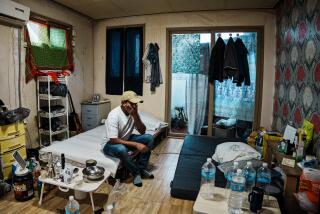Court Hears Gay Marriage Case
After 16 years together, they are the kind of couple who worry about life’s nagging “what ifs?” What if the mortgage doesn’t get paid? What if the furnace blows up? What if Julie Goodridge keels over and the state will release her body only to next of kin?
“Well,” said Hillary Goodridge, “that would be her second cousin Patsy in Mississippi.”
Such concerns about the legal benefits and responsibilities of marriage prompted the Goodridges to lend their names to a legal case that could make Massachusetts the first state to legalize same-sex marriage. But even as the Supreme Judicial Court deliberates a lawsuit in which six other gay and lesbian couples have joined as plaintiffs, state lawmakers are preparing legislation that could supersede any court decision.
The debate makes Massachusetts the latest battleground for an ongoing effort to allow gays to claim the full rights and benefits of marriage. Similar efforts are underway in Indiana and New Jersey, after failing in Hawaii and Alaska.
Following a year of impassioned discussion, Vermont passed legislation in 2000 creating an institution called civil union. But although it extended many benefits of marriage to gay and lesbian couples, it stopped short of using the term “marriage.” The protections and provisions of civil unions also were not valid outside Vermont.
Many same-sex couples called the Vermont solution insufficient, if not insulting.
“I have no interest in having a civil union. I have only an interest in getting the legal protections of marriage,” said Julie Goodridge, 45. “I don’t think it’s appropriate, given the history of this country, to have a separate institution when there is a perfectly good institution that exists for the majority of the people in this nation.”
Julie Goodridge owns an investment advisory company. Hillary Goodridge, 46, directs the Unitarian Universalist Church’s fund-raising program. The couple -- who searched family histories on both sides to come up with a surname they both liked -- live in a Boston neighborhood known for its diversity. Some of the legal limitations of their relationship became clear when their daughter, Annie, was born with complications seven years ago and was whisked off to a neonatal intensive care unit.
While Julie was in recovery from the caesarean procedure, Hillary realized she had no legal relationship to the baby she would subsequently adopt.
The Goodridges were part of a crowd that packed the hearing room of the Supreme Judicial Court last week for arguments in a case watched closely by gay rights advocates and people who don’t want the right of marriage extended to lesbians and gay men.
Dozens of organizations on both sides have filed friend-of-the-court briefs to support or oppose the lawsuit.
The seven couples who are plaintiffs in the court effort first sought marriage licenses two years ago. When town clerks rejected their applications, they went to court. A state Superior Court dismissed the case, contending that the Legislature should decide whether same-sex couples can marry.
One of the first questions posed last week to lead counsel Mary Bonauto, a lawyer for Gay and Lesbian Advocates and Defenders, was why the state’s top court should take action that no other state has attempted.
“Because it is the right thing to do,” Bonauto answered. “The exclusion of the plaintiffs from marriage ... violates the fundamental right that these plaintiffs enjoy with all others in this commonwealth.”
Arguing against the measure, state Assistant Atty. Gen. Judith Yogman said the main reason to prohibit same-sex marriage is to uphold “the state’s interest in fostering the link between procreation and marriage.”
On Beacon Hill, state House Speaker Thomas M. Finneran, a Democrat, said last week that he would support a constitutional amendment limiting the definition of marriage to a union between one man and one woman. Finneran called “the traditional definition” of marriage the one that he was “most comfortable with.”
A similar proposal banning same-sex marriage died through inaction in the Legislature last year. But another bill declaring that “only the union of one man and one woman shall be valid or recognized as a marriage in Massachusetts” has been filed for consideration during this legislative term.
But the process for passing constitutional amendments in Massachusetts is cumbersome, requiring majority votes in both legislative houses as well as a majority vote in a general election. The procedure could drag on beyond the end of the 2004 legislative session, possibly extending all the way to the 2006 general election.
A Supreme Judicial Court decision is expected within three months.
Supporters of same-sex marriage say that if the court rules in their favor, gay and lesbian couples could obtain licenses to marry until such time as a constitutional amendment abolished that right.
More to Read
Start your day right
Sign up for Essential California for news, features and recommendations from the L.A. Times and beyond in your inbox six days a week.
You may occasionally receive promotional content from the Los Angeles Times.






